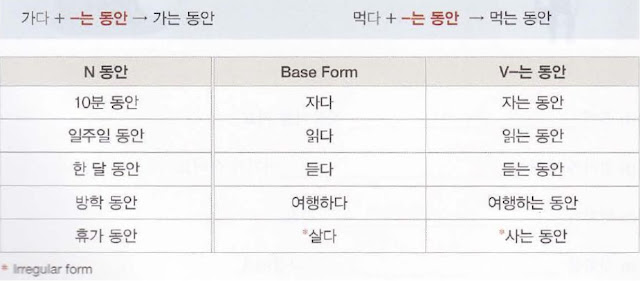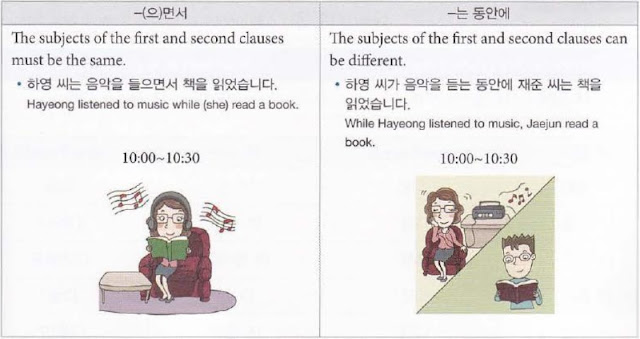 어제 4시간 동안 공부했어요.
어제 4시간 동안 공부했어요.
Yesterday, I studied for four hours.
곰은 겨울 동안에 겨울잠을 자요.
Bears hibernate during winter.
친구들이 점심을 먹는 동안 나는 숙제를 했어요.
I did my homework while my friends were eating lunch.
Grammar Focus:
This pattern expresses the length of time starting when a certain action or behavior begins and lasting until it ends. It corresponds to ‘during’ or ‘while’ in English. After nouns, 동안 is added, and after verbs -는 동안 is added.
 When used in the form ‘V-는 동안’, the subjects of the first and second clauses can be either the same or different.
When used in the form ‘V-는 동안’, the subjects of the first and second clauses can be either the same or different.
• (내가) 한국에서 사는 동안 (나는) 좋은 친구들을 많이 만났어요.
While I lived in Korea, I made a lot of good friends.
• 내가 친구들과 노는 동안 동생은 학교에서 열심히 공부했어요.
While I played with my friends, my little brother/sister was studying hard at school.
Conversation:
A: 얼마 동안 한국에 있을 거예요?
How long will you be in Korea?
B: 3년 동안 있을 거예요.
I should be here for three years.
A: 방학 동안에 뭐 할 거예요?
What will you do during the vacation?
B: 친척 집을 방문할 거예요.
I plan to visit my relatives’ home.
A: 비행기가 2시간 후에 출발해요.
The plane will depart in two hours.
B: 그러면 비행기를 기다리는 동안 면세점에서 쇼핑을 합시다.
In that case, let’s do some shopping at the duty-free shop while we wait for our flight.
Comparison:
How are -(으)면서 and -는 동안 different?
-(으)면서 is used when one person performs two or more actions simultaneously. However, -는 동안(에) can be used even when the subjects of the first and second clauses are not the same; that is, it can be used to indicate that while the subject of the first clause is performing some action, the subject of the second clause is also performing an action.
 >> Full of ‘Korean grammar in use – Beginner’: Click here
>> Full of ‘Korean grammar in use – Beginner’: Click here
>> Fanpage: Say Hi Korean


![[Korean grammar] ‘ㅅ’ 불규칙 (Irregular Conjugation)](https://sayhikorean.com/wp-content/uploads/2021/10/112.1.jpg)
![[Korean grammar] ‘ㅎ’ 불규칙 (Irregular Conjugation)](https://sayhikorean.com/wp-content/uploads/2021/10/111.1.jpg)
![[Korean grammar] ‘르’ 불규칙 (Irregular Conjugation)](https://sayhikorean.com/wp-content/uploads/2021/10/110.1.jpg)
![[Korean grammar] ‘ㄷ’ 불규칙 (Irregular Conjugation)](https://sayhikorean.com/wp-content/uploads/2021/10/109.1.jpg)
![[Korean grammar] ‘ㅂ’ 불규칙 (Irregular Conjugation)](https://sayhikorean.com/wp-content/uploads/2021/10/108.1.jpg)
![[Korean grammar] ‘ㄹ’ 불규칙 (Irregular Conjugation)](https://sayhikorean.com/wp-content/uploads/2021/10/107.1.jpg)
![[Korean grammar] ‘ㅡ’ 불규칙 (Irregular Conjugation)](https://sayhikorean.com/wp-content/uploads/2021/10/106.1.jpg)
![[Korean grammar] Indirect Quotation Contracted Forms: -대요, -래요, -재요, -냬요](https://sayhikorean.com/wp-content/uploads/2021/10/105.1.jpg)
![[Korean grammar] Indirect Quotations](https://sayhikorean.com/wp-content/uploads/2021/10/104.1.jpg)
![[Korean grammar] Direct Quotations: ‘Quoted speech’ + 하고/라고 + V](https://sayhikorean.com/wp-content/uploads/2021/10/103.1.jpg)
![[Korean grammar] A/V-(으)ㄴ/는데요 Additional Endings](https://sayhikorean.com/wp-content/uploads/2021/10/102.1.jpg)